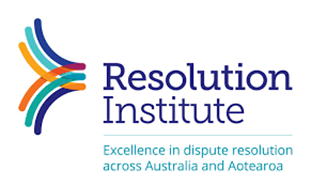
How to successfully represent clients in mediation
- 8 hrs
- 6 CPD Points
- 28/08/2025 - 28/08/2025
- Interactive
- Start from $799.00
- CN0803_PSK1
How to Successfully Represent Clients in Mediation
Date & time: 28 August 2025, 9am to 5pm AEST
Venue: College of Law - Level 4, 570 George Street, Sydney 2000
Supercharge your mediation game. Learn from top experts how to maximise outcomes - craft persuasive openings, navigate tough sessions, overcome impasses, and harness tech and AI. Essential for lawyers managing mediation in litigation. Don’t miss this powerhouse workshop.
Facilitated by: Michael Mills, Principal, Advisory, Dispute Resolution, Investigations, Insurance & Risk, SOLVE|RESOLVE, and Catherine Davidson, Mediator, AMDRAS accredited and IMI certified.
Guest Speaker: Judge Gerard Phillips, President, Personal Injury Commission
This program is presented by the College of Law in collaboration with Resolution Institute.
Resolution Institute members and College Alumni are entitled to save 10% off the fee for this course. Use ALUMNI10 at the checkout.
At the end of this live webinar, you will earn 6 CPD points.
Morning tea, lunch and afternoon tea will be provided by the College of Law.

Course Outline
If you represent clients in mediation, particularly in the midst of litigation, this seminar should not be missed! In this information packed seminar, learn from leading experts as to how lawyers can improve outcomes from mediation, including mediation process and the role of the mediator to assist in a successful resolution. In this interactive workshop you will learn about:
- The foundations for negotiation - skills and processes
- The mediation model, the role of the mediator and the parties at each stage of the process
- How to properly prepare for mediation, including the drafting of statement of issues and preparation of opening statements
- Persuasive preparation for joint and caucus sessions
- Effective communication in order to enhance outcomes
- Use of proper language for the mediation mindset
- How to deal with common mediation issues and blockers, such as impasses, walk-outs or threats of walk outs, and the timing of offers, and
- Leveraging technology and AI for effective mediation presentation and representation
9.00am: Opening & Introduction
- Importance and value of mediation, presented by Judge Gerard Phillips, President, Personal Injury Commission
9.30am: Foundations for negotiation, mediation - skills & process
- Activity - self diagnostic conflict/negotiation style profile
- Negotiation overview
- Interest based negotiation:
- Addressing Interests, not positions
- Separating the people from the problem
- The 7 Steps Framework
- Negotiation Preparation Handout
- Mediation model
- The Diamond Model
- The Role of mediator and parties in each stage
- Deep dive into openings/ joint session/ private sessions/ agreement
- Working effectively with your client/the other side/ and the Mediator in each stage
- What leading mediators say are the dos and dont’s of representing clients at mediation
10.30am: Break
10.45am: Process Skills
- Activity – Engaging in an annual salary performance review
- Debunking Negotiation Myths
- What is helpful and what isn’t
- What is persuasive and why
- The Science as well as “art” of persuasive negotiation
- Mediation Preparation – it’s much more than just content
- Preparation with and for: the client; the Mediator; the other Person/Party
- Drafting statement of issues and preparation for opening statement
- Statement of issues – purpose
- Brief chronology
- Framing of commercial interests
- Referencing the law
- Activity – Drafting Statement of Issues (Attendees working in pairs. Each pair takes a role from the Program On Negotiation, Harvard Law School (PON) case. Pairs to Draft Statement.)
- Persuasive preparation for joint and caucus sessions
1.00pm: Lunch Break
2.00pm: Skills
- Activity – Preparation of Opening Statement (Attendees working in pairs)
- Effective communication enhances outcomes
- Listening for interests
- Working with emotions strategically
- The 5 Core Concerns - the lens and lever approach
- Silence - MIT Study: impact on successful negotiation outcomes
- Questions - how to ask an open question
- Framing – The Mediation Mindset for Language
- How to reframe
- Benefits and risks
- Matching and Mirroring – using these skills strategically
- Dealing with common mediation issues and blockers
- Impasses
- Walk outs – or threats
- Offers – timing
- How and when to get the Mediator to help reality test/doubt create with your client
- Caucuses – separate/cross caucuses (parties only/lawyers only)
3.15pm: Break
3.30pm: Mediation Exercise
- Develop a Mediation Plan, working in pairs with an observer
- Debrief exercise
4.30pm: Technology & effective mediation preparation and representation
- Use of AI in mediation
- Mediation Bundle Software
- Virtual Mediation – when to use and when not to use
- Hybrid model
5.00pm: Conclusion
- Document take aways
- Negotiation Preparation Sheet – based on 7 Elements
- 5 Core Concerns Preparation Sheet
- Mediation Plan Framework
This webinar is ideal for solicitors in general practice, civil litigation lawyers, personal injury and family lawyers, commercial and property lawyers.

Michael Mills, Principal, Solve Resolve
Director of Australian Geographic Pty Ltd NSW Council member of Yalari
Michael Mills is recognised as one of Australia’s leading lawyers for complex commercial litigation and dispute resolution. As a top commercial litigator, he has been the lead defence lawyer for some of Australia’s largest and most complex disputes, representing both leading Australian and international companies, here and overseas. He is considered by industry as a “go-to” lawyer for strategically important commercial and “bet the company” disputes. This includes regulatory and mass torts/civil liability disputes, as well as front end insurance, risk advisory and dispute resolution work.
Michael has also been the lead lawyer in the recovery of over $2 billion for his clients in various commercial disputes and court actions. His creative tactical thinking in resolving disputes has seen his practice expand into providing strategic advice to clients in relation to directors and officers liability risks, corporate governance, front end insurance and risk management advice, as well as alternative means to resolve commercial problems and disputes.
Michael is also a nationally recognised and accredited mediator. He teaches courses in Australia and overseas on civil liability and dispute resolution. This includes teaching “Resolving Civil Disputes” at UNSW, being a guest lecturer at Stanford Law School on several occasions since 2011, author of Thomson Reuter’s text, Dispute Resolution (2018) and a past Chair of Resolution Institute (previously LEADR) and Advisory Board member of RAND Institute of Civil Justice.

Catherine Davidson, Mediator, trainer, and conflict management consultant
Catherine Davidson is a commercial Mediator and is AMDRAS accredited and IMI certified. She practices in Australia and internationally, principally in the Asia Pacific. She is appointed to national and international mediator panels and mediates complex, multi - party disputes, including court referred matters. In recent years she has mediated several class actions in Australia, and disputes involving litigation funders.
Who’s Who Legal 2025 ranked her as a Thought Leader Global Elite: Commercial Mediation.
In addition, Catherine is Teaching Fellow LLM at University of New South Wales. She is a member of the teaching faculty with the Resolution Institute in Australia delivering mediation training. She also lectures on Negotiation Skills in the Advanced and Executive MBA programmes of the University of Technology Sydney.
The course complies with the mandatory requirements of Professional Skills. At the end of this live webinar, you will earn 6 CPD points.
The time listed for this course is Australian Eastern Standard Time (AEST). Please take note of any time differences if you are registering from WA, SA, NT or from outside Australia
If you intend to claim CPD units for this educational activity, please note that CPD activities are not accredited by the Law Society of NSW or any other equivalent local authority, with the exception of Western Australia. If you hold a practising certificate in a state or territory other than Western Australia and this educational activity extends your knowledge and skills in areas that are relevant to your practice needs or professional development, then you should claim one (1) "unit” for each hour of attendance, refreshment breaks not included. The annual requirement is ten (10) CPD units each year from 1 April to 31 March. Some practitioners, such as accredited specialists are required to complete more than ten (10) units each CPD year.
Practitioners holding WA practising certificates are not eligible to earn CPD points for this course.
Please be aware that video/audio recording may occur at professional development events organised by the College of Law for use on our website, marketing materials and publications. By attending and participating in a College of Law Continuing Professional Development course, you consent to the College of Law photographing or recording and using your image and likeness.
